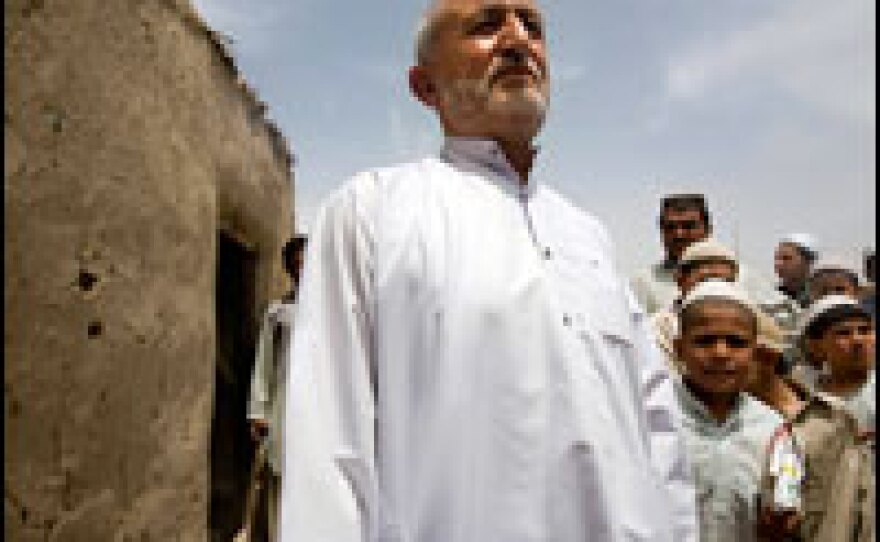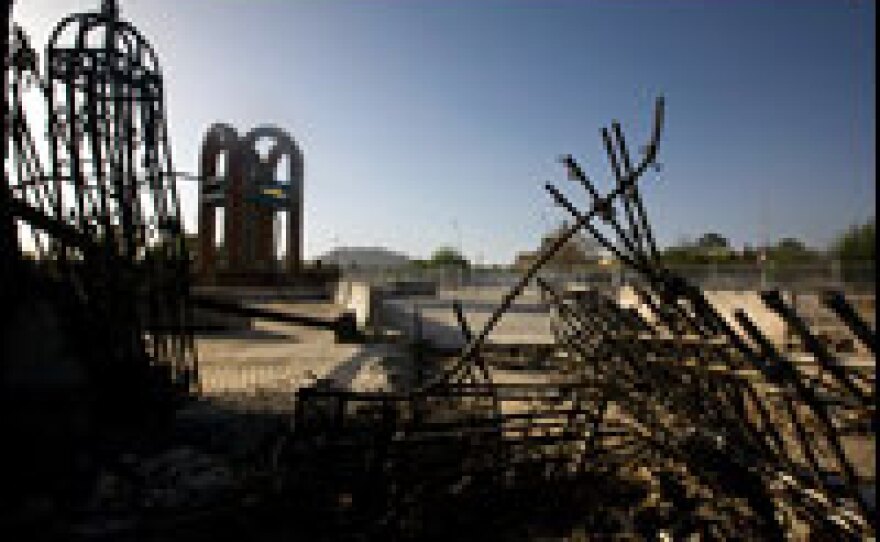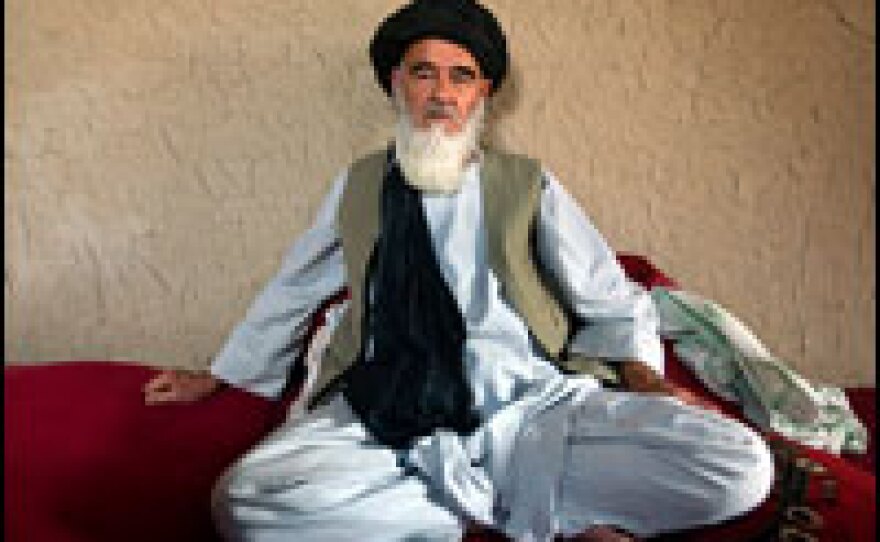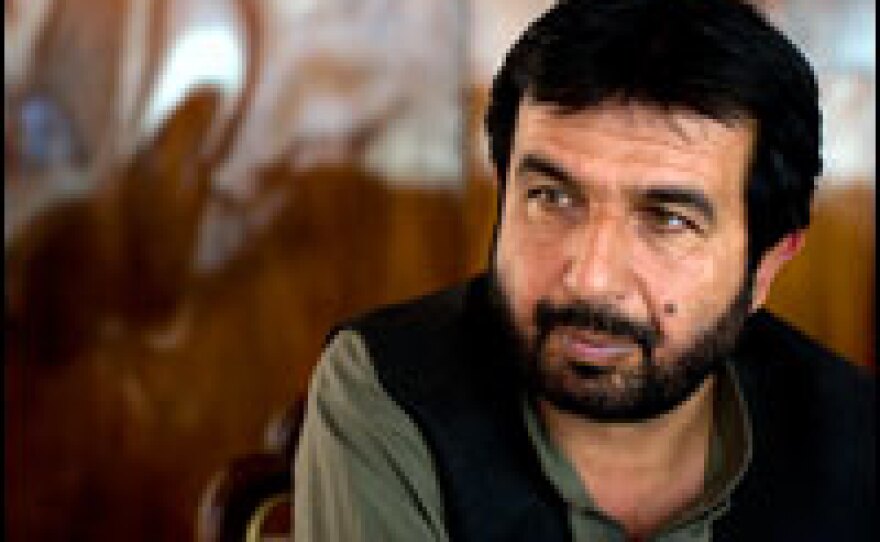


The number of assassinations in Afghanistan is growing, particularly in Kandahar province, where Taliban militants are strong and well-organized. Dozens of politicians, government employees, activists and Muslim clerics have been targeted in an attempt to silence critics and disrupt the government.
Last month in Kandahar, Afghanistan's largest southern city, a local education director and a health official were shot dead by militants who stormed a government compound.
And in a case that garnered international attention, armed men on motorbikes gunned down Sitara Achakzai, a prominent female politician and women's rights advocate, on April 12 as she chatted with a neighbor outside her home.
A Voice For Afghan Women Silenced
Derwayza Achakzai points to the spot outside their house, only a few steps from the front door, where his wife was murdered. The chemistry professor says he was upstairs when he heard the shots. He ran outside and found his wife sprawled on the sidewalk.
"Her feet were right here, when," his voice chokes with emotion and he turns to a nearby wall. With shaking fingers, he claws at the bullet holes. He says the two rounds that missed his wife struck here. The casings weren't found.
The killers of Sitara Achakzai are just as elusive.
The Taliban claimed responsibility for murdering the outspoken activist, who was a deputy chairwoman of Kandahar's provincial council. Police arrested two store owners alleged to have tipped off the gunmen that she was outside.
But no one has been charged, as is usual in such killings. In a city where residents say it is difficult to tell friend from foe, Achakzai says he believes his wife's killers could belong to any number of groups.
"There's chaos here. You have to be afraid of everyone. I always run away when I see someone wearing thick clothes. I figure the chances are high he's a suicide bomber," Achakzai says.
Hit-And-Run Tactics Of The Taliban
Kandahar Gov. Tooryalai Wesa blames the killings on militant groups like the Taliban. But he says he lacks the thousands of additional police officers needed to secure the province and prevent assassinations.
"They are not in the position to come to face-to-face fighting," he says of the Taliban. "This is, I think, the easy way for them, and this is an effective way for them — that's to ride a motorbike and then walk on the street or ride on the street, and see who is alone and who is the right target. They can do that."
Provincial officials have been provided bodyguards, Wesa says. And some Afghans who feel threatened have moved into safe houses.
The entire council of ulama, or Muslim scholars, and other clerics who preach against militants feel they are under siege. Four mullahs have been gunned down in Kandahar in recent months.
One of the clerics, Qari Sayed Ahmad, who delivered anti-militant sermons at his mosque in Kandahar last year, was shot dead in April as he returned home.
The targeted killings led Sayed Mohammad Hanefi and dozens of other pro-government clerics to hastily move into the Afghan National Army compound in Kandahar.
Hanefi says he does much of his preaching these days from a makeshift radio station in the compound. If he does leave the compound, it's with no fewer than 10 police officers.
Attacks At The Heart Of Kandahar's Government
But even heavily guarded compounds are at risk. Three suicide bombers tried to storm the governor's compound recently. They were unsuccessful, but killed seven people outside the gates.
Two assaults on the nearby provincial council compound in the past six months were more deadly. In the latest attack, seven bombers dressed in stolen army uniforms stormed the provincial council chambers.
Where one bomber attacked, only the walls and window frames in the compound's massive hall remain standing. The force of the explosion blew out all the light fixtures. They dangle in the breeze. One of the bomber's boots and bits of his bloodstained camouflage uniform are among the rubble.
Other attackers began firing at workers and visitors in the compound's second building.
Mohammad Ehsan, a deputy chairman of the provincial council, says he grabbed a gun from one of the bodyguards and fired back. He says the fighting lasted 20 minutes. When it was over, all the attackers were dead, along with 12 others at the compound.
Ehsan was lucky. He survived with nothing more than a sore neck.
He says the attacks and other efforts at intimidation haven't scared him away from his work. He receives frequent threats on his cell phone from men who claim to be with the Taliban, he says.
For now, provincial council members meet in the well-guarded home of council leader Ahmad Wali Karzai — who survived an attack Monday on his motorcade as it made its way to the capital, Kabul.
Karzai, a younger brother of Afghan President Hamid Karzai, was not harmed in the attack, but one of his bodyguards was killed.
"This is a war for justice and for freedom and for democracy, and we are not just going to run away from it. It's tough, but we will continue our struggle against the terrorists and al-Qaida," Karzai recently told NPR.
Government Work Slows Amid The Threats
But other would-be targets say the assassinations have halted much government and social work in Kandahar.
Shahida Hussein, a women's rights activist in Kandahar, says everyone is afraid, and she rarely leaves her home now.
Neither Canadian troops tasked with helping secure the city nor the Afghan police seem to be willing or able to bring assassins to justice, she says. The Canadian-led task force did not respond to repeated requests for an interview.
An additional 21,000 U.S. forces are heading to Afghanistan at the order of President Obama in an effort to improve security. They will be deployed mainly in southern Afghanistan to counter the Taliban insurgency.
Copyright 2022 NPR. To see more, visit https://www.npr.org. 9(MDAzMjM2NDYzMDEyMzc1Njk5NjAxNzY3OQ001))







